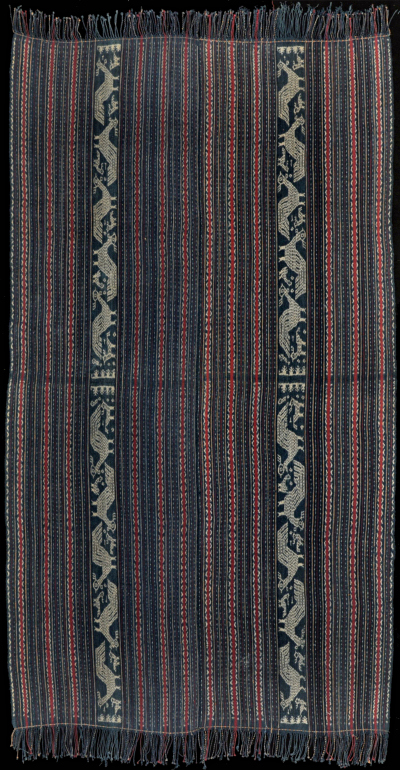| |
 
 | | | |
094 Timor, West Timor
Beti naek (men's wrap) 
| | Locale: | Insana, most likely Manufui, possibly Manumain B. | | Period: | 1940-1955 | | Yarn: | Cotton, hand-spun, coarse | | Technique: | Warp ikat | | Panels: | 2 | | Size: | 103 x 189 cm (3' 4" x 6' 2") LW: 1.83 | | Design: | Blanket, beti naik, in two panels. Numerous longitudinal bands, finely ikated with tiny geometrical patterns. Two wider bands are decorated with ten stylised partridges, here called manu fui (Ind. ayam hutan), the symbol of virility. General colour impression indigo with purple. As is common with this kind of motif, chicks are used as a secondary motif. | | Comment: | Fine example of the type, with tight ikat work that gives precise contours and favours the figurative elements. Heavy, densely woven cloth. Twisted fringes. According to the reputable seller cloth dates from the 1930s but the author prefers to date it somewhat younger until its age is confirmed. | | Background: | Chapters on Timor and West Timor. | | Exhibited: | Woven Languages, Museu do Oriente, Lisbon, 2014/15.
.
Timor: Totems and Tokens, Museu do Oriente, Lisbon, 2019-2020. | | Published: |
Woven Languages, 2014.
Ikat Textiles of the Indonesian Archipelago, 2018,
Timor: Totems and Tokens, 2019.
| | Compare: | 132 258 287 | | Sources: | Very similar to beti from Ainiut, Insana, in Yeager and Jacobson, Textiles of Western Timor, Plate 154. However, the authors, on p. 153, indicate that plain red stripes are a hallmark of Manumain B. See also p.153, 154; rooster motif in Fig. 129. Very similar to beti in Yoshimoto, Ikat, Fig. 184, except that here the stripes have an overall indigo and purple tone, instead of red and yellow. | | |

©Peter ten Hoopen, 2025
All rights reserved.
|
|


